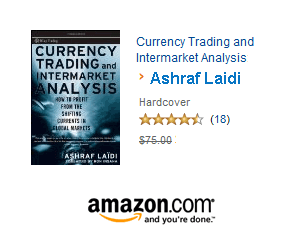Forum > View Topic
by Ashraf Laidi
Posted: Feb 22, 2010 5:00
Comments: 8936
Posted: Feb 22, 2010 5:00
Comments: 8936
Forum Topic:
Gold, Oil & Indices (Equity & Bond Indices)
Discuss Gold, Oil & Indices (Equity & Bond Indices)






Scientific Proof That High Frequency Trading Induces Adverse Changes In Market Microstructure And Dynamics, And Puts Market Fairness Under Question
In a research paper by Reginald Smith of the Bouchet Franklin Institute in Rochester titled "Is high-frequency trading inducing changes in market microstructure and dynamics?" the author finds that he "can clearly demonstrate that HFT is having an increasingly large impact on the microstructure of equity trading dynamics. Traded value, and by extension trading volume, fluctuations are starting to show self-similarity at increasingly shorter timescales.
http://www.zerohedge.com/article/scientific-proof-high-frequency-trading-induces-adverse-changes-market-microstructure-and-dy
"The reason for the global financial crisis and debt crisis in Europe is that the current international credit rating system does not correctly reveal the debtor's repayment ability."
Dubbed as the worlds first non-Western sovereign credit rating agency, in its debut international report, Dagone (means Big Justice in Chinese) downshifted the US to AA with a negative outlook, while UK and France were given AA-; Belgium, Spain, Italy with A-.
http://www.zerohedge.com/article/us-stripped-aaa-credit-ratingby-china
Ashraf
congrats dude
u put on the blog hte good call on oil.
thank you
please send me analysis of gold in next week
"With a doji on the weekly candlestick, the market may have now finished testing the downside in gold," says Scotia, pointing to last week's price-pattern of falling sharply (down 2.2%), only to recover and end unchanged.
New data released late Friday from US regulator the CFTC meantime showed commercial "industry-side" players in the gold futures and options market cutting their bearish position at the fastest pace since April 2009 last week.
Falling to a 13-week low, the "net short" position of bullish bets minus bearish bets held by miners, refineries and bullion banks often referred to as the "smart money" shrank by 16.1% in the week-ending last Tuesday.
Overall, the commercial traders' "bull ratio" meaning the number of bullish contracts they hold as a proportion of all their directional bets on gold futures and options jumped above 1-in-3, the strongest bull ratio since December 2008.
Non-commercial "speculative" traders meanwhile slashed their net long position (of bullish minus bearish bets) to the equivalent of 852 tonnes, also down by 16.1% from a week earlier as hedge funds and institutional players as well as private investors closed almost one contract in every twelve they held the Tuesday before.
"The latest CFTC figures suggest that weak-handed speculators are largely out of the market," says Standard Bank's latest Precious Metals Monthly.
"Much of the shift in the net [speculative] position had come from short-covering, and so it is unlikely that there is scope for much more speculative liquidation in the current environment."
Over in the physical gold bullion market, "The sharp drop to $1200 has seen strong physical buying reappear and scrap sales dwindle," Standard Bank continues, while gold's typical summer lull now looks set to see gold "treading water" in July and August "all other things being equal".
Nevertheless, "Underlying financial tensions point to a buy-on-dips policy ahead of further inflationary concerns."
Friday saw a further "trickle" of redemptions, notes another London dealer, from the giant SPDR gold ETF the $51 billion gold-backed trust fund that trades as a stock in New York, Tokyo, Hong Kong and Singapore.
Slipping back to 1,314.5 tonnes, the SPDR's hoard of gold bullion held at HSBC bank-vaults in London peaked as June ended at 1,320 tonnes, more 16% greater from the start of the year.
"Debt on government balance sheets and worries that the world could be heading towards a double-dip recession are behind the gold surge," says Charles Cooper at London brokerage Oriel Securities, speaking to The Guardian newspaper.
The fresh threat of economic downturn, he says, means governments "could be tempted to print more money to dig us out of a hole.
"That could precipitate inflation, making gold even more popular as a safe haven."
New figures published Monday showed the UK's 2008-2009 recession cutting GDP more sharply than previously reported, down by 6.4% peak-to-trough.
This week brings a raft of consumer- and business-price inflation data from the European Union, United States, Japan and New Zealand.
EU regulators are now conducting "stress tests" on 91 major banks accounting for almost two-thirds of the 27-nation union. Results will be published on July 23rd.
Minutes from the US Federal Reserve's latest policy meeting will be released on Wednesday, with analysts and traders watching closely for dissent over the promise of exceptionally low policy rates for "an extended period", as well as any talk of fresh quantitative easing of the money supply.
"Sovereign bonds have been defaulting for almost as long as there have been sovereign bonds. The problems go back many centuries. A good overview created for the IMF is The Costs of Sovereign Default by Eduardo Borensztein and Ugo Panizza. Some countries are serial defaulters, with a long history of sovereign defaults. Many have defaulted on sovereign debt five times or more."
http://www.calculatedriskblog.com/2010/07/part-2-how-often-have-sovereign.html